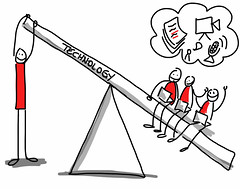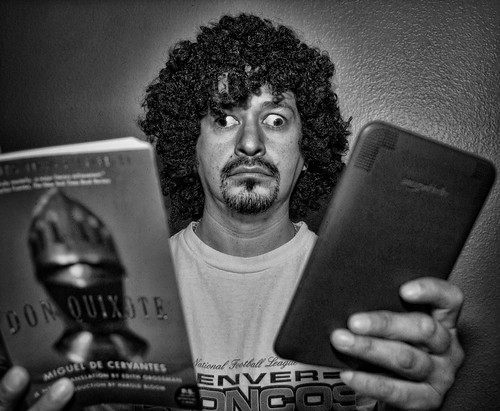I found the Cambridge forum radio program quite interesting. I listened to it in the evening and found myself thinking about it persistently throughout the next day. I even surreptitiously brought up the juicier tidbits, like Edison’s use of the word “hello”, into conversation with some of my students to get their thoughts about the concepts that were discussed. Notably, at the beginning of the talk, Dr. O’Donnell talks about how many new technologies come with positive gains, but potentially also serious loss. He likens text technology to a new frontier that rapidly transcends being new and becomes the regular culture. He went on to illustrate this point with notion that we have become so dependent on the positive aspects of the automobile that we are willing to self-bargain away the loss of life, in the tens of thousands, due to traffic accidents. He suggests that this is a deal we consciously make in a cultural step towards progress, especially with new text technologies.
It is an interesting idea but I think it is problematic because I don’t think that human beings are all that rational or logical when it comes to most of our choices – particularly around “progress”. Rather, I would posit that, in fact, our very ability to disregard objective cost/benefit analysis when it doesn’t work in our favour is the only reason we can adapt to new technologies in the first place. This idea has been studied in psychology in experiments like the Milgram experiment (Milgram, 1963) and the Stanford prison experiment (O’Toole, 1997) where it seemed that ordinary people were willing to torture others simply because they were told to rather than objectively or rationally make moral or ethical decisions.
With regards to text technologies, take, for example, the new social landscape where digital social networks reign supreme. Many of us have stories where connecting through Facebook allowed us to reconnect with long lost friends, or find distant relatives, and so on. More importantly, grassroots, decentralized, text based social media dependent campaigns on platforms like Twitter seem to be responsible for massive sociological tide changes such as the occupy movement or the Arab spring. Indeed the new ability to create digital, self-published, open access word and sound bites can be seen as a far better approach to spreading democracy than through armed conflict.
This is the macro scale positive effects, but what about the micro scale? Typically, many people in the west have relatively easy access to text based forms of digital social networks. People can blog, text, message, email, Facebook message, tweet and so on. They can send messages to the general public or to individuals. They can enter forums to discuss ideas of any kind and join a digital community that is willing to provide support, belonging, and acceptance.
But then why are there rising rates of depression, self-harm, substance abuse, and general mental health issues with youth who would, on the surface, be the most adept practitioners or, endemic natives of the ‘new frontier’ (Levine, 2006). How is it that they are indigenous to the digital social media world and yet be alienated by it? Even harmed by our new technologies it if we look at tragic stories like what happened to Amanda Todd and others like her.
On the macro scale, clearly the powers that be are not happy with what this new frontier has to offer. For example, the U.K. is currently calling for massive changes to the way that its citizens’ private information is monitored. Closer to home, the U.S.A., a supposed champion of rights and freedoms, has been caught (CBC News, 2013) secretly spying on it’s own citizens.
So, are these the trade offs that Dr. O’Donnell was talking about? Am I willing to be spied on by government to have the benefit of technological connectivity? Am I willing to accept that people will suffer rising rates of mental health issues so that I can experience the world digitally? No and no. These are not choices nor are they acceptable bargains, rather I think society does its best to hide, ignore, and potentially justify these problems as long as the perceived benefit is there.
Sources
CBC News. (2013, November 27). CBC News. Retrieved September 10, 2014, from CBC News: http://www.cbc.ca/m/touch/news/story/1.2442448
Levine, M. (2006). The Price of Privilege. New York: Harper Collins.
Milgram, S. (1963). Behavioural Study of Obedience. Retrieved September 10, 2014, from academic.evergreen.edu: http://academic.evergreen.edu/curricular/social_dilemmas/fall/Readings/Week_06/milgram.pdf
O’Toole, K. (1997, August 1). The Stanford Prison Experiment: Still powerful after all these years. Retrieved September 11, 2014, from Stanford News Service: http://news.stanford.edu/pr/97/970108prisonexp.html











Blog Post #1 – Stanford Forum
I found the Cambridge forum radio program quite interesting. I listened to it in the evening and found myself thinking about it persistently throughout the next day. I even surreptitiously brought up the juicier tidbits, like Edison’s use of the word “hello”, into conversation with some of my students to get their thoughts about the concepts that were discussed. Notably, at the beginning of the talk, Dr. O’Donnell talks about how many new technologies come with positive gains, but potentially also serious loss. He likens text technology to a new frontier that rapidly transcends being new and becomes the regular culture. He went on to illustrate this point with notion that we have become so dependent on the positive aspects of the automobile that we are willing to self-bargain away the loss of life, in the tens of thousands, due to traffic accidents. He suggests that this is a deal we consciously make in a cultural step towards progress, especially with new text technologies.
It is an interesting idea but I think it is problematic because I don’t think that human beings are all that rational or logical when it comes to most of our choices – particularly around “progress”. Rather, I would posit that, in fact, our very ability to disregard objective cost/benefit analysis when it doesn’t work in our favour is the only reason we can adapt to new technologies in the first place. This idea has been studied in psychology in experiments like the Milgram experiment (Milgram, 1963) and the Stanford prison experiment (O’Toole, 1997) where it seemed that ordinary people were willing to torture others simply because they were told to rather than objectively or rationally make moral or ethical decisions.
With regards to text technologies, take, for example, the new social landscape where digital social networks reign supreme. Many of us have stories where connecting through Facebook allowed us to reconnect with long lost friends, or find distant relatives, and so on. More importantly, grassroots, decentralized, text based social media dependent campaigns on platforms like Twitter seem to be responsible for massive sociological tide changes such as the occupy movement or the Arab spring. Indeed the new ability to create digital, self-published, open access word and sound bites can be seen as a far better approach to spreading democracy than through armed conflict.
This is the macro scale positive effects, but what about the micro scale? Typically, many people in the west have relatively easy access to text based forms of digital social networks. People can blog, text, message, email, Facebook message, tweet and so on. They can send messages to the general public or to individuals. They can enter forums to discuss ideas of any kind and join a digital community that is willing to provide support, belonging, and acceptance.
But then why are there rising rates of depression, self-harm, substance abuse, and general mental health issues with youth who would, on the surface, be the most adept practitioners or, endemic natives of the ‘new frontier’ (Levine, 2006). How is it that they are indigenous to the digital social media world and yet be alienated by it? Even harmed by our new technologies it if we look at tragic stories like what happened to Amanda Todd and others like her.
On the macro scale, clearly the powers that be are not happy with what this new frontier has to offer. For example, the U.K. is currently calling for massive changes to the way that its citizens’ private information is monitored. Closer to home, the U.S.A., a supposed champion of rights and freedoms, has been caught (CBC News, 2013) secretly spying on it’s own citizens.
So, are these the trade offs that Dr. O’Donnell was talking about? Am I willing to be spied on by government to have the benefit of technological connectivity? Am I willing to accept that people will suffer rising rates of mental health issues so that I can experience the world digitally? No and no. These are not choices nor are they acceptable bargains, rather I think society does its best to hide, ignore, and potentially justify these problems as long as the perceived benefit is there.
Sources
CBC News. (2013, November 27). CBC News. Retrieved September 10, 2014, from CBC News: http://www.cbc.ca/m/touch/news/story/1.2442448
Levine, M. (2006). The Price of Privilege. New York: Harper Collins.
Milgram, S. (1963). Behavioural Study of Obedience. Retrieved September 10, 2014, from academic.evergreen.edu: http://academic.evergreen.edu/curricular/social_dilemmas/fall/Readings/Week_06/milgram.pdf
O’Toole, K. (1997, August 1). The Stanford Prison Experiment: Still powerful after all these years. Retrieved September 11, 2014, from Stanford News Service: http://news.stanford.edu/pr/97/970108prisonexp.html